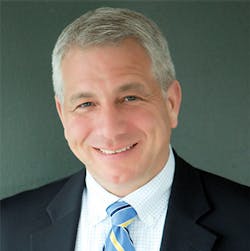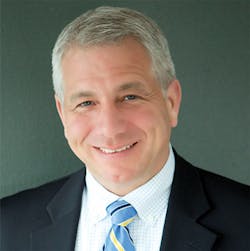Business Forum: Creating an accelerator for optics, photonics, and imaging
This month, I interview Don Golini, the newly announced chairman of the board of Luminate, which is a business accelerator based in Rochester, NY, and focused on helping startups move beyond the struggling, prototype stage to emerge in the broader "optics-enabled" marketplace.
Don has a history of entrepreneurship, notably as president of QED Technologies, which he founded in 1996 and sold in 2006. He's the former chairman of the Rochester Angel Network and entrepreneur in residence at High Tech Rochester. Now, he is actively consulting and advising companies through his SANICA Ventures firm. I wanted to get his perspective on the new Luminate organization, announced in July 2017, to understand its purpose, scope, and potential impact on the broader U.S. photonics community.
Conard Holton:What is Luminate aiming to accomplish?
Don Golini: The Luminate accelerator is a resource that will improve the chances of success for startups in the optics, photonics, and imaging (OPI) domain. It will do so by providing resources such as seed funding, expert advice, coaching, mentoring, facilities, equipment, and customer/investor networking opportunities.
Some of these assets are uniquely available in Rochester, NY, due to its long history of optics entrepreneurship and education. However, like any successful venture, Luminate's success will be driven by the people who are involved, including the program leadership and the world-class advisory board—all of whom have a passion for helping new entrepreneurs succeed. We know this is a big undertaking, but fully intend to deliver on the promise of helping our portfolio companies achieve commercial success.
CH: How did this accelerator come about? What factors led to its creation?
DG: The idea of a domain-specific, well-funded startup accelerator is not new. However, at the end of the day, it required a strong and committed funding source. New York State Governor Andrew Cuomo has been holding regional economic development funding competitions for several years.
In Rochester, the entrepreneurship and optics/photonics working groups have been advocating for this type of program for some time. Under the leadership of Jim Senall and High Tech Rochester (HTR), this year's proposal for Luminate met the funding threshold and was approved for $10 million over two years by New York State.
CH: How will you select the startups you will fund and what do you expect from them?
DG: We have already seen strong interest in the program, and expect to receive over 100 applications from around the world. Luminate's leadership team will closely vet the proposals as they are received, and will perform high-level due diligence throughout the application window on a rolling basis. The advisory board members, along with industry and academic experts, will be tapped for their input as well.
The bottom line is that Luminate will be making investments in about 20 startups over a two-year period, and will be selecting the companies based on their likelihood to provide a strong return on investment. The selection process will more closely resemble that used by a VC fund, and less like the more-typical business plan competition.
Once in the program, companies will be focusing on customer discovery, product/market fit, and customer acquisition. The most successful companies will find commercial traction during their time in Luminate, and will be attracting investments at the end of the program from corporate investors, VCs, angel groups, and the Luminate program itself.
CH: What's the role of High Tech Rochester? And the state of New York?
DG: High Tech Rochester is a non-profit whose mission is to help tech entrepreneurs launch successful companies, and to help established businesses increase revenues and profits. HTR was in fact the recipient of the $10 million New York State funding, and will ultimately benefit from equity that results from Luminate's investments.
So, these investments are an outstanding opportunity for HTR to create a funding stream for future investments in startups, and initiation of other programs to support the business ecosystem it serves. The funding model very nicely aligns the interests of all participants.
CH: What are the limitations—is this only for New York-based companies?
DG: We are looking for real startup companies. If you are a student or faculty member dabbling in your startup part-time, you are probably not yet ready for this program. That means the company must be fully formed, with at least two committed, qualified, full-time employees.
Successful applicants will preferably have a working prototype and early customer interest/traction. We are seeking the best and brightest OPI startups from all over the country. Non-U.S. companies are also eligible, but must be authorized to work in the U.S. In addition, we are reaching out to potential mentors, corporate sponsors, and VC partners that might be interested in actively participating in the program.
CH: AIM Photonics is also based in Rochester—what do you expect will be your relationship with that organization?
DG: We are delighted that the AIM Photonics CEO Michael Liehr has agreed to serve on the Luminate advisory board. If a Luminate company is synergistic with the AIM Photonics program, we will be sure to make those resources available in any way that will best leverage the complementary skills. This, of course, will be in the best interest of all parties involved.
CH: Any preferences for the kinds of products or technologies that you'll fund?
DG: We are very open to any and all companies that are enabled by optics, photonics, or imaging technologies. While we understand this will encompass a very broad array of technologies and markets, we also believe we will be able to bring to bear any necessary resources to support such companies through the deep networks of our advisory board, leadership team, and extensive resources available in Rochester. We hope to attract startups led by visionary entrepreneurs solving challenging problems, including machine vision, inspection, biophotonics, security, surveillance, augmented and virtual reality, and autonomous vehicles.
CH: So, how did you find yourself chairman of the board of Luminate? Who else is on the board? I hear you have now hired a full-time managing director—tell us more.
DG: I've worked with Jim Senall and HTR for years after my exit from QED Technologies and, quite simply, I believe in the mission of helping startup companies succeed. When HTR was awarded the contract that led to the creation of Luminate, I raised my hand to get involved, as the program fell right in my sweet spot.
After some brainstorming with Duncan Moore at the University of Rochester, we began reaching out to other successful OPI entrepreneurs and quickly found out we were not alone in feeling a passion for giving back and helping the next generation of entrepreneurs succeed. Nearly everyone we asked quickly agreed to serve.
It would be difficult for a startup to get access to any one of these busy executives on their own—however, through their participation in Luminate, they will get exposure to the collective wisdom of decades of experience from some of the most successful people in our industry. I believe that will be a game-changer for our startups.
We were also extremely fortunate to attract three-time entrepreneur and seasoned business executive Dr. Sujatha Ramanujan as Luminate's managing director. Sujatha got her Ph.D. in electrical engineering from the University of Michigan and has been involved in multiple startups in optics and materials, while also serving senior leadership roles in larger companies. Most recently, she has been providing launch support services to early-stage companies, and has a true passion for helping to accelerate startups in the optics and photonics space.
CH: Any thoughts on the state of accelerators and entrepreneurship in photonics? What more can be done—for example, more "challenges" like the SPIE Startup Challenge at Photonics West?
DG: Newly created business incubators, accelerators, and entrepreneurship classes have been showing up all over the world, as successful startups are widely seen as the solution to stagnant local economies. While true, the path to success is not always obvious, and sadly, many of these efforts have failed to deliver on their promise. We have all seen the beautiful, new built-out co-working space created to serve the masses of young entrepreneurs, only to end up mostly empty.
So, what does it take to create a successful accelerator? I believe there are three essential components to success: a critical mass of qualified entrepreneurs, competent programming and facilities, and sufficient seed funding. However, as is true for every successful entity, I believe it always comes down to leadership. I believe that Luminate has all of these essential components, and will make a significant difference for the optics, photonics, and imaging startup scene for years to come.
For more information, please visit luminate.org.
About the Author

Conard Holton
Conard Holton has 25 years of science and technology editing and writing experience. He was formerly a staff member and consultant for government agencies such as the New York State Energy Research and Development Authority and the International Atomic Energy Agency, and engineering companies such as Bechtel. He joined Laser Focus World in 1997 as senior editor, becoming editor in chief of WDM Solutions, which he founded in 1999. In 2003 he joined Vision Systems Design as editor in chief, while continuing as contributing editor at Laser Focus World. Conard became editor in chief of Laser Focus World in August 2011, a role in which he served through August 2018. He then served as Editor at Large for Laser Focus World and Co-Chair of the Lasers & Photonics Marketplace Seminar from August 2018 through January 2022. He received his B.A. from the University of Pennsylvania, with additional studies at the Colorado School of Mines and Medill School of Journalism at Northwestern University.

